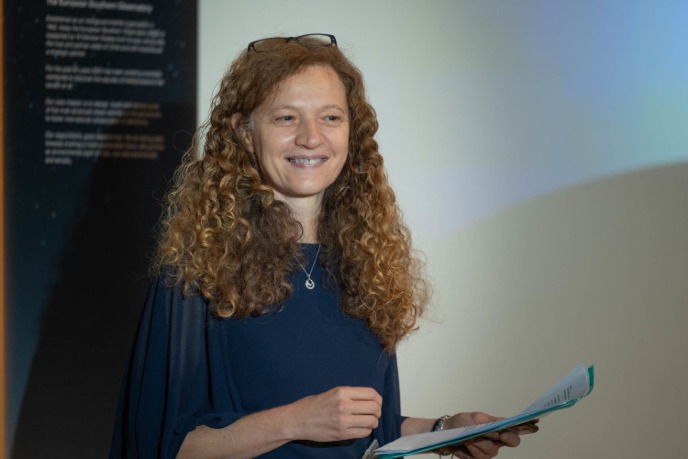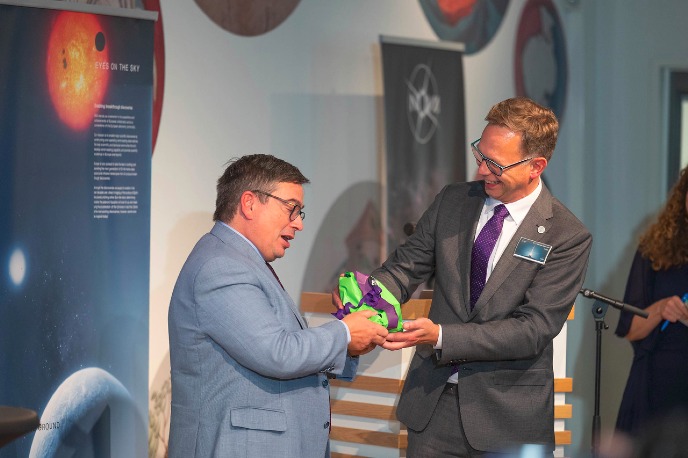Astronomy community celebrates 60 years of ESO
The Dutch astronomy community celebrated the 60th anniversary of the European Southern Observatory (ESO) and the collaboration with the Netherlands Research School for Astronomy (NOVA) in the areas of instrumentation, science, and social relevance on Monday 26 September at Museum Boerhaave in Leiden.
ESO was founded 60 years ago by a number of countries including the Netherlands, and now, the European intergovernmental organization for astronomy has 16 member states in the southern hemisphere. ESO builds and manages the most powerful and advanced telescopes in the north of Chile, which are being extensively used by European, and thus also Dutch astronomers for scientific research. The circumstances (dark, high, and dry) make the northern Chile an excellent area for astronomical research.
Eyes and ears
The gigantic telescopes, such as the Very Large Telescope on top of the Cerro Paranal mountain, the one being built on the Cerro Armazones mountain, and the large array of ALMA dishes located on the Chajnantor plateau have many instruments attached to them (the ‘eyes and ears’ of the telescope) for astronomical observations. The Netherlands has contributed to the development and construction of these instruments for all facilities. NOVA engineers and project managers are also working on developing technologically advanced and challenging instrumentation for the future Extremely Large Telescope, which is expected to go into operation later this decade. Dutch astronomers have already been able to make many fantastic discoveries using the facilities.
Over a hundred attendees from science, politics, and industry were present at the event, including minister Robbert Dijkgraaf from the Ministry of Education, Culture, and Science, Linda Tacconi, ESO Council's president, Xavier Barcons, director general of ESO, Tim de Zeeuw and Harry van der Laan, former ESO directors. Rector Magnificus Cisca Wijmenga and FSE dean Joost Frenken were also present on behalf of the University of Groningen.
Alive and kicking
Scientists and engineers from ESO and the NOVA institutes at the universities of Amsterdam, Groningen, Nijmegen, and Leiden contributed to the symposium, which was chaired by Amina Helmi, scientific director of NOVA, Michiel Rodenhuis, executive director, and Ewine van Dishoeck, NOVA ambassador.
Michiel Rodenhuis gave Xavier Barcons a present for the 60th anniversary of ESO: a specially engraved version of one of the first parts of MICADO, one of the first-generation instruments on ESO’s Extremely Large Telescope which is being built in northern Chile. The part was designed for the mounting of the complex cryogenic filter wheel of MICADO, for which NOVA is responsible. Amina Helmi said that this meeting showed how alive and kicking ESO is, the observatory that is already renowned in the field of astronomy.
The day ended with an interview with minister Dijkgraaf conducted by Ewine van Dishoeck in which the importance of structural cooperation between the Dutch astronomy community and ESO in the areas of optic/infra-red and submillimetre astronomy was emphasized.


| Last modified: | 11 October 2022 4.55 p.m. |
More news
-
13 May 2024
Trapping molecules
In his laboratory, physicist Steven Hoekstra is building an experimental set-up made of two parts: one that produces barium fluoride molecules, and a second part that traps the molecules and brings them to an almost complete standstill so they can...
-
29 April 2024
Tactile sensors
Every two weeks, UG Makers puts the spotlight on a researcher who has created something tangible, ranging from homemade measuring equipment for academic research to small or larger products that can change our daily lives. That is how UG...
-
16 April 2024
UG signs Barcelona Declaration on Open Research Information
In a significant stride toward advancing responsible research assessment and open science, the University of Groningen has officially signed the Barcelona Declaration on Open Research Information.
